In South Africa, we still have self-avowed and proud socialists in our political midst; from the ironically named Economic Freedom Fighters to the alliance of the former ruling party, the African National Congress with the South African Communist Party. Yet socialism, by its definition, is the negation of the individual rights that South Africans hold dear.
What is understood as socialism, in its technical sense, is too wide and varied in its nuances to be covered entirely in this piece. Yet the defining feature of all socialist systems is the intervention of the state in the lives of citizens, making decisions on their behalf that in a capitalist economic model would be taken by themselves.
I will use the definition of socialism that is considered scientific by those socialists who are of the Marxist school of thought. There are other socialists like Proudhon who are not of the Marxist school of thought, but ultimately share the same vision of worker-owned means of production.
Socialism professes to want a world wherein workers in various businesses that were not started by them, nor had their initial capital investment, own the means of production in that business. The term ‘means of production’ is deserving of an article by itself, but for our purposes, we can safely say that by owning the means of production, they mean owning the actual business.
Therefore, socialism posits that workers should own the businesses they work for because the owners of those businesses are exploiting them by keeping the profits or the surplus value of their productive activity for themselves, after having paid their wages, of course. The profit made by the business is deemed to be ‘stolen’ from workers by the owner of the business.
The Marxist version of socialism has been the most popular, especially in Africa. Marx merely sees socialism as a transitory stage (he never mentions how long it lasts, of course) towards his utopia, communism. What Marx theorised, Vladimir Lenin, one of the leaders of the Bolshevik Revolution in the early 1900s that saw the founding of the USSR, applied.
In scientific socialism, the workers are represented by the party, or the ‘workers’ party’. The workers’ party is the one that runs the state and takes economic decisions on behalf of everyone. Since the workers are running the state through their agents in the workers’ party, the workers have effective ownership of the means of production through their agents.
Now the reality of what is described above is, of course, far removed from the grandiose ideals that you will see in the pages of socialist texts. In reality, socialism has been and will be, as long as it still socialism, tyranny of the worst kind; tyranny by men who believe they are doing good.
Looking at the theories alone, one sees the seeds of tyranny already germinating. By saying the state owning the means of production is a necessary stage towards socialism, which is what Marxists/Leninists argue for, one is admitting to the use of violence, which is what the state deals in, for the achievement of one’s goals.
The retort would be that the capitalist state favours the capitalists, so a worker’s state is needed for justice. This is where the truth of methodological individualism helps us in seeing that what is called a state of workers is simply a state with incredible powers, controlled by a few men.
A simple question with regard to the workers in China, even before the reforms of the 1980s under Deng Xiaoping that saw sweatshops becoming synonymous with China, will be instructive. Currently, in the state run by the Communist Party of China, trade unions and worker demonstrations are considered social ills. Striking is outlawed by the CCP, or should we say, by the Chinese workers!
Prior to the horrors of China, we had the USSR which exemplified the tyrannical nature of socialism, from the direction of economic activity to what the central planners thought was best, to the imprisoning in gulags of those considered ‘enemies of the revolution’ and the devastating famine caused by central planning (the Holodomor). The USSR is the poster child of why socialism is tyrannical.
In South Africa, we have the right to association, to free expression, and the most important one, the right to engage in trade. Under socialist countries, these rights are a limit against achieving the socialist dream. The right to trade? You cannot trade freely when the state professes to direct economic activity and undermines private property through means like expropriation or price floors and ceilings, which are common in socialist countries.
The right to association and free expression is also heavily curtailed, because for all the faults of capitalism, it gives everyone the freedom to be whatever they want to be. Socialists can and do criticise states that respect private property rights. Yet in countries like China or Cuba, criticism of the state is a one-way ticket to being ‘disappeared’.
Countries like Cuba, China, and Venezuela rank quite low on indexes that show their respect for human rights. Unfortunately, these are countries that are idolised by some in our political landscape. This should be worrying for us because it means our leaders see the people of Venezuela eating rats and applaud, saying they want that for us too!
In South Africa, we have strong civil and individual liberties that I am proud of. We should be acutely aware that any self-professed socialist government will take these liberties away. Therefore, the next time you hear a politician or an academic mention the joy of socialism, think about your precious liberties and reflect that the road to serfdom is paved with the liberties that you would lose along the way.
The views of the writer are not necessarily the views of the Daily Friend or the IRR.
If you like what you have just read, support the Daily Friend.

